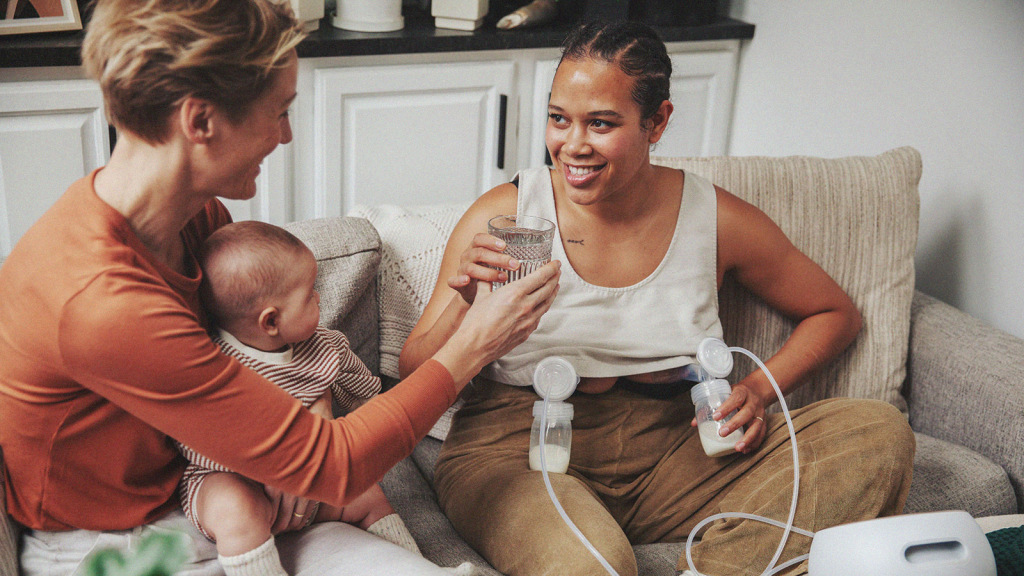Breast Milk Backup Stash: How to Pump Enough Milk to Store
Nail down the perfect pumping schedule to build a stash of breast milk
Let’s face it, between going back to work, running errands or getting that last-minute pedicure, it can be challenging to find the time for every single feeding your baby needs. Breast pumping allows you to produce and store breast milk for all of those baby-free moments, and as a mother, you should know that me-time isn’t selfish—we need that time to recharge. To make sure you can take advantage of the benefits of breastfeeding and get the occasional night out, here are five tips on how to pump enough milk to store up a good freezer stash.
1. Add an extra pump session after your milk supply is established
When should you start pumping for storage? Once you get in the nursing groove and your supply regulates—typically about six to 12 weeks after giving birth—it’s a great time to dive into the world of pumping. Most moms find morning is the best time to add a pump, as your supply is usually naturally higher after you’ve (hopefully) gotten a little extra rest. Time your pump session for a little after nursing. Because your supply fluctuates based on demand or output your body will start to produce more milk as you begin pumping on a regular basis.
Generally speaking, in the first few weeks of breastfeeding while you’re still establishing a milk supply, it’s better to use both breasts at each feeding. However, if your baby expresses a breast preference once regular milk production is established, it’s fine to just nurse with the one. If that’s the case, you can avoid losing out on milk production from the other breast by pumping it while nursing.
Bonus tip: Make sure you have all the accessories you need for successful pumping—including flanges in the correct size. If you need breast pumps and accessories, our marketplace partners can help.
2. Choose your storage bags wisely
You don’t want to lose one precious drop of that hard-earned, life-sustaining liquid gold. A sturdy bag with a double zippered top will ensure your milk is safely and securely stored. Most bags expand at the bottom so they can stand on the counter, making them easy to fill. For some great options, check out these breast milk storage bags.
Bonus tip: To easily pour your freshly-pumped milk into a storage bag, use a flange from your pump as a funnel.
3. Freeze the right amount in each bag
When it comes to using your stash, breast milk is only good in the fridge for about 24 hours after it’s totally thawed. To avoid wasting any excess, or not thawing enough, try measuring out the quantity of an average feeding into each storage bag. That way you can easily defrost the exact amount your baby needs every time.
Bonus tip: Liquid expands when frozen, so make sure not to overfill the bags to avoid bursting and leaking. And don’t forget to label your milk with the date it was pumped.
4. Store your bags efficiently in your freezer
Here’s how to use your freezer stash. To keep your breast milk neat and tidy, freeze bags flat on a tray or cookie sheet so they’ll take up less room in your freezer—space that can be better used for frozen crockpot meals and pints of ice cream!. Then organize the frozen bags in order of the date they were pumped so you can easily locate, grab and use the earliest pumped milk.
Bonus tip: When using previously frozen milk, make sure to follow the breast milk storage guidelines.
5. Don’t stress about building a large stash
If you plan to regularly pump at work, you’ll be bringing more milk home each day—most likely the same amount your baby will drink in one day’s time. If you start with a few extra bags in the freezer, you’ll always end up ahead. Having a nice little freezer supply will give you peace of mind in case you experience changes in breast milk supply or a day with lower output, have to skip a pumping session or need to leave the kiddo for a last-minute date night.
Bonus tip: If you’re experiencing a longer-term lull in milk production, check out this expert advice on restoring your breast milk supply.
Looking to begin your breastfeeding journey? We can help. Order your breast pump through The Lactation Network’s marketplace partners, and request an insurance-covered consultation with a lactation consultant (IBCLC) to help you find the best pump for you.
We’re here for you, every step of the way. We work with your insurance to provide in-home, in-office, or telehealth visits with an IBCLC.




